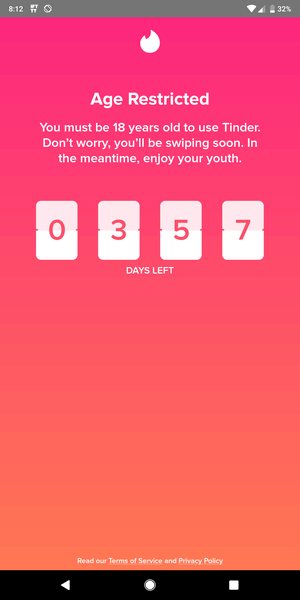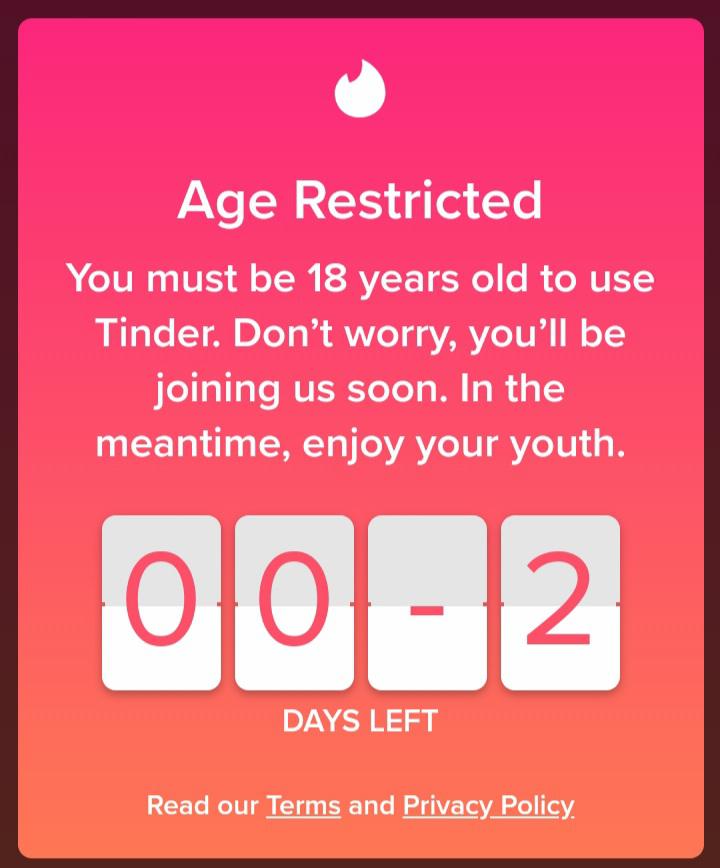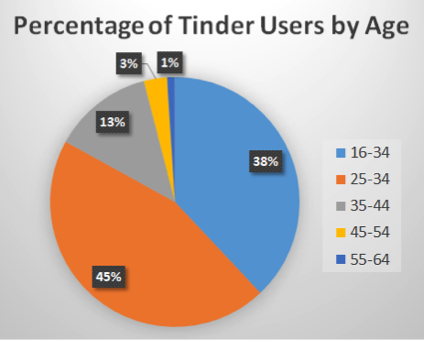Are you wondering whether there’s an age requirement to use Tinder? Well, you’ve come to the right place. In this article, we’ll delve into the topic and discuss what you need to know. Whether you’re a young adult looking to join the world of online dating or a concerned parent wanting to keep your child safe, we’ve got you covered. So, let’s get started!
When it comes to using Tinder, yes, there is an age requirement. In most countries, users must be at least 18 years old to create an account and use the app. This is primarily due to legal reasons and the fact that Tinder is designed for adult users. It’s important to note that Tinder takes age verification seriously, although it can never be foolproof. They have measures in place to ensure that users are within the appropriate age range, such as linking accounts to Facebook, conducting manual age checks, and utilizing machine learning algorithms. However, it’s still essential for users to be cautious and mindful of interacting with others on the platform, given the varied nature of online interactions.
Understanding Tinder
Tinder has become a household name in the world of dating apps. It has revolutionized the way people meet and connect with potential partners, particularly among young adults. With its easy-to-use interface and swipe-right-for-yes approach, Tinder has gained immense popularity among singles worldwide. However, with its popularity comes the question: Is there an age requirement to use Tinder?
What is Tinder?
Tinder is a location-based dating app that allows users to swipe through profiles and connect with others who show mutual interest. Launched in 2012, Tinder quickly gained a reputation as a platform primarily used for casual hookups. However, over the years, it has evolved into a more diverse and inclusive space for individuals seeking various types of relationships, from casual dates to long-term partnerships.

How does Tinder work?
Tinder’s functionality revolves around swiping. When you open the app, you are presented with a series of profiles that contain photos, a brief bio, and other information provided by the user. You can then swipe right if you are interested in connecting with that person or swipe left if you’re not. If both parties swipe right on each other’s profiles, it’s a “match,” and they can begin chatting within the app.
Tinder uses a algorithm to determine which profiles are shown to users, taking into account factors such as location, age, and preferences set by the user. The app also offers additional features, such as Tinder Plus and Tinder Gold, that allow users to access advanced features like unlimited swipes and the ability to see who has liked their profiles.
Why is Tinder popular among young adults?
Tinder’s popularity among young adults can be attributed to several factors. Firstly, its simple and intuitive interface makes it accessible and easy to use for people of all tech-savviness levels. Additionally, the app’s swiping feature offers a fun and gamified experience that appeals to younger users.
Moreover, Tinder provides a platform for young adults to meet and connect with people outside their immediate social circles. It offers a wide range of potential matches based on location, allowing users to explore new connections and expand their dating pool. This aspect of Tinder appeals to young adults who are curious about meeting new people and establishing connections beyond their usual social circles.
Lastly, young adults are often at a stage in their lives where they are open to exploring different types of relationships, whether it’s casual dating or searching for a more serious partner. Tinder’s diverse user base and flexibility in terms of relationship preferences make it an attractive platform for young adults looking for various types of connections.

Age Restrictions on Tinder
Is there an age requirement to use Tinder?
Yes, there is an age requirement to use Tinder. In most countries, the minimum age to join Tinder is 18 years old. This policy is in place to comply with legal regulations and protect minors from potential dangers associated with online dating apps.
What is the minimum age to join Tinder?
The minimum age to join Tinder is 18 years old. This means that anyone under the age of 18 is not permitted to create an account or use the app. Tinder enforces this age restriction to ensure user safety and comply with legal requirements worldwide.
Are there any maximum age limitations on Tinder?
No, there are no maximum age limitations on Tinder. The app is open to users of all age groups, as long as they meet the minimum age requirement. Tinder aims to create an inclusive and diverse community by allowing people of all ages to join and connect with others.
Legal Considerations
Legal age of consent for online dating apps
The legal age of consent varies from country to country and even within different regions of a country. It is crucial for dating apps like Tinder to abide by these legal age restrictions to ensure user safety and prevent potential legal issues. Online dating apps must consider these legal implications in their policies regarding age requirements.
How does Tinder verify the user’s age?
Tinder uses various methods to verify the user’s age during the registration process. While the specifics of their age verification methods are not disclosed publicly, Tinder employs several techniques, including document verification and utilizing databases to verify the authenticity of user-provided information.
Tinder takes age verification seriously to maintain a safe and responsible platform for users. However, it is important to note that no age verification method is foolproof, and there is always a possibility of individuals misrepresenting their age.
Potential legal implications for underage users
Allowing underage users to access dating apps like Tinder can have serious legal implications for both the app and the users themselves. Online interactions between adults and minors can lead to harmful or exploitative situations, which is why it is essential for dating apps to enforce age restrictions.
From a legal standpoint, dating apps have a responsibility to protect their users, particularly minors, from potential harm. Failure to comply with age restrictions and neglecting to implement safety measures can result in legal trouble for the app, including lawsuits and government intervention.

Safety Measures for Young Users
What safety features does Tinder have in place for young users?
Tinder has implemented several safety features to protect young users and promote a safer environment within the app. These features include:
-
Age Verification: As mentioned earlier, Tinder verifies the age of its users during the registration process to ensure that only individuals who meet the minimum age requirement can access the app.
-
Reporting and Blocking: Tinder provides users with the ability to report and block other users if they encounter inappropriate behavior or feel unsafe. The reporting feature allows the Tinder team to investigate and take necessary action against users who violate the app’s guidelines.
-
Safe Messaging: Tinder has introduced a safety feature called “Noonlight” that allows users to share details about their upcoming dates with a trusted contact. This feature provides an added layer of security for users, particularly young adults who may be more vulnerable to potential risks.
-
Safer Dating Tips: Tinder supplies users with safety tips and guidelines on its website and within the app. These resources educate users on ways to protect themselves, recognize potential red flags, and maintain personal safety while using the app.
How can parents monitor their child’s activity on Tinder?
As a parent, it is important to be aware of your child’s online activities, including their use of dating apps like Tinder. While direct monitoring of your child’s Tinder activity may not be possible, there are several ways you can promote their safety:
-
Open Communication: Create an open and non-judgmental environment where your child feels comfortable discussing their online experiences with you. Encourage them to share any concerns or questions they may have.
-
Education on Online Safety: Educate your child about the potential risks associated with online dating and the importance of maintaining personal safety. Provide them with resources such as articles, videos, or books that discuss safe online practices.
-
Setting Boundaries: Establish clear boundaries regarding app usage and online interactions. Discuss with your child what is and isn’t acceptable while using dating apps, and ensure they understand the consequences of breaching those boundaries.
-
Monitoring Apps: Consider using parental control apps that allow you to monitor your child’s digital activities. These apps provide insights into the apps they use, websites they visit, and their overall screen time. However, it is important to use such tools with respect for your child’s privacy and trust.
Educating teenagers on online dating safety
Education plays a crucial role in ensuring the safety of teenagers engaging in online dating. Schools and educational institutions can incorporate online dating safety education into their curriculum, teaching teenagers about potential risks, red flags, and strategies to protect themselves while using dating apps.
Additionally, awareness campaigns can be conducted to raise awareness among teenagers and parents about safe app usage. These campaigns can provide information on various aspects of online dating safety, including privacy settings, reporting mechanisms, and recognizing signs of potential danger.
Collaboration between dating apps and educational institutions can further enhance online dating safety education. By working together, they can create comprehensive programs that highlight not only the potential risks but also the benefits and responsible usage of dating apps.
Concerns about Age Restrictions
Arguments in favor of strict age restrictions on Tinder
There are several arguments in favor of strict age restrictions on Tinder and other dating apps. Here are some key points:
-
Protection of Minors: Age restrictions protect minors from potential dangers associated with online dating, including exploitation, cyberbullying, and exposure to inappropriate content.
-
Legal Compliance: Enforcing age restrictions allows dating apps to comply with regional laws and regulations surrounding online interactions between adults and minors.
-
Responsible Platform: Implementing age restrictions demonstrates a dating app’s commitment to providing a responsible platform for its users, ensuring their safety and well-being.
-
Parental Peace of Mind: Age restrictions offer parents peace of mind, knowing that their children are not exposed to potentially risky interactions on dating apps.
Arguments against strict age restrictions on Tinder
While age restrictions on dating apps like Tinder are essential for safeguarding minors, some arguments are raised against these restrictions:
-
Maturity and Responsibility: Some individuals argue that age restrictions alone do not guarantee maturity or responsibility. They believe that young people who demonstrate the necessary maturity should be allowed to use dating apps with proper guidance.
-
Stigmatization: Strict age restrictions can stigmatize young adults who genuinely seek meaningful connections or are mature enough to engage in dating. They may feel excluded and unfairly judged based solely on their age.
-
False Age Representation: Critics argue that age restrictions are not foolproof and may lead to individuals misrepresenting their age to gain access to the app. This can potentially expose younger users to inappropriate interactions.
-
Incomplete Protection: Age restrictions alone may not provide comprehensive protection for minors. Additional safety measures are necessary to address other potential risks, such as age-inappropriate content or manipulation by older users.
Impact of age restrictions on user experience
Age restrictions on Tinder do have an impact on the user experience, especially for those who fall just below the minimum age requirement. While these restrictions are necessary for ensuring safety, they can be frustrating for young individuals who are eager to explore romantic or social connections.
However, it is crucial to prioritize the safety and well-being of minors over potential inconveniences. Dating apps like Tinder should focus on creating a positive user experience within the limits of age restrictions, ensuring their platforms remain safe and responsible for all users.

Alternatives for Underage Users
Are there any alternative dating apps for underage users?
While underage individuals may not be able to use popular dating apps like Tinder, there are alternative platforms that cater specifically to teenagers and young adults below the minimum age requirement. Some examples of these alternative dating apps include:
-
Yubo: Yubo is a social networking app that allows teenagers to connect and meet new people. It focuses on fostering friendships and social interactions rather than solely focusing on dating.
-
Spotafriend: Spotafriend is another app designed for teenagers to meet and make new friends. It incorporates safety features such as age verification and moderation to ensure a safer environment for users.
-
MyLOL: MyLOL is a social networking platform for teenagers aged 13 to 19. It allows users to connect, chat, and share content with others in their age group.
It is important to note that while these alternative apps cater to underage users, they still need to comply with local laws and regulations regarding online interactions between minors and adults.
Is it advisable for underage individuals to use dating apps?
The advisability of underage individuals using dating apps is a topic of debate. While these apps may provide an opportunity to meet new people and explore relationships, there are several factors to consider:
-
Risk of Exploitation: Young individuals may be more vulnerable to manipulation or exploitation by older users on dating apps. It is crucial for parents and guardians to carefully assess the potential risks and educate their children accordingly.
-
Emotional Preparedness: Engaging in dating and romantic relationships requires emotional maturity and preparedness. It is essential for underage individuals to understand the emotional complexities involved and approach relationships with caution.
-
Social and Emotional Development: Adolescence is a critical period for social and emotional development. Overreliance on dating apps or premature involvement with relationships can potentially hinder healthy development and interpersonal skills.
-
Legal Implications: Despite the availability of alternative dating apps for underage users, it is essential to respect and comply with the age restrictions set by these platforms. Engaging in fraudulent activities or misrepresenting age can have serious legal consequences.
Ultimately, the decision of whether underage individuals should use dating apps rests with their parents or guardians, who hold the responsibility of ensuring their safety and well-being.
Responsibility of Parents and Guardians
Having open conversations about online dating
Parents and guardians play a vital role in guiding their children’s experiences with dating apps and online interactions. Establishing open and non-judgmental lines of communication is crucial to foster trust and encourage their children to share their experiences and concerns.
Having conversations about online dating can include discussing potential risks, setting boundaries, and addressing any questions or misconceptions. It is important for parents and guardians to approach these conversations with empathy and understanding, allowing their children to express their thoughts and opinions openly.
Setting and enforcing appropriate boundaries
Establishing and enforcing appropriate boundaries is crucial when it comes to underage individuals using dating apps. Parents and guardians should discuss and set clear guidelines regarding app usage, online interactions, and meeting strangers in person. These boundaries should be based on the child’s maturity level, local legal restrictions, and the specific dating app being used.
Enforcing these boundaries is equally important. Regularly monitoring your child’s usage, discussing any potential concerns, and addressing violations of agreed-upon boundaries helps ensure their safety and responsible usage of dating apps.
Role of parental guidance in ensuring safe app usage
Parents and guardians have a vital role in guiding their children’s use of dating apps. By providing ongoing guidance and support, they can help their children navigate the complexities of online interactions and relationships.
This guidance can include educating their children about potential risks, promoting responsible app usage, and encouraging open communication. Parents and guardians can stay informed about the latest trends and developments in dating apps, enabling them to better support their children’s online experiences.

Psychological and Emotional Considerations
Impact of online dating on emotional development of teenagers
Engaging in online dating at a young age can have both positive and negative impacts on the emotional development of teenagers. Some potential considerations include:
-
Emotional Vulnerability: Teenagers may be more emotionally vulnerable and prone to impulsive behavior, making them susceptible to emotional highs and lows associated with online dating.
-
Self-Esteem and Body Image: Online dating platforms often emphasize physical appearance, which can impact a teenager’s self-esteem and body image. It is important for parents and guardians to promote positive self-image and self-worth while discussing the superficial nature of online dating.
-
Sense of Identity: Online dating can influence a teenager’s exploration of their own identity and preferences. Encouraging self-reflection and open discussions about personal values and boundaries can help teenagers navigate these aspects of their development.
-
Healthy Relationship Dynamics: Online dating can provide teenagers with opportunities to explore and develop healthy relationship dynamics. However, parents and guardians must ensure their children understand the importance of consent, respect, and open communication within relationships.
Potential risks of meeting strangers online
One of the inherent risks of online dating, regardless of age, is the potential of meeting strangers who may have ulterior motives. Teenagers, in particular, may be more vulnerable to manipulation or exploitation.
Parents and guardians must educate their children about the risks of meeting strangers online and discuss strategies to mitigate these risks. This includes communicating guidelines for personal safety, such as meeting in public places and always informing a trusted adult about plans to meet someone in person.
Understanding the importance of genuine connections
While dating apps like Tinder offer opportunities to connect with new people, it is important for teenagers to understand the importance of genuine connections beyond superficial appearances. Encouraging them to prioritize qualities such as shared values, interests, and emotional compatibility can help foster healthier and more meaningful relationships.
Parents and guardians can also emphasize the importance of building relationships based on trust and open communication, rather than solely relying on digital interactions. Encouraging teenagers to engage in offline activities and socialize within their communities can provide them with a more holistic approach to dating and interpersonal relationships.
Tinder and Age Discrimination
Are there any discriminatory practices based on age on Tinder?
Age discrimination is a significant concern in the online dating world, including on platforms like Tinder. Some users may have preferences for specific age ranges or discriminate against potential matches solely based on their age.
While Tinder allows users to set preferred age ranges when searching for potential matches, it does not actively promote or support discriminatory practices based on age. The platform aims to create a diverse and inclusive user base by encouraging connections across various age groups.
Exploring potential consequences of age-based discrimination
Age-based discrimination on dating apps like Tinder can have various consequences, both for individuals and society as a whole. These consequences include:
-
Feelings of Rejection: Discrimination based on age can lead to feelings of rejection and loneliness, particularly for individuals who may fall outside the preferred age range of potential matches.
-
Age Stereotyping: Age-based discrimination can perpetuate stereotypes and societal biases surrounding age. It can reinforce negative perceptions and misconceptions about certain age groups, limiting opportunities for genuine connections and relationships.
-
Missed Opportunities: Age-based discrimination may prevent individuals from exploring connections with potential partners who could offer meaningful relationships, regardless of their age.
-
Negative Impact on Self-Esteem: Encountering age-based discrimination can negatively impact an individual’s self-esteem and self-worth, leading to decreased confidence and reluctance to pursue further connections.
Promoting inclusivity and diversity on dating apps
To combat age-based discrimination, dating apps like Tinder should prioritize promoting inclusivity and diversity within their platforms. They can achieve this by:
-
Strict Guidelines: Implementing strict guidelines that discourage age-based discrimination and actively addressing reports of such behavior.
-
Educating Users: Providing educational resources within the app that emphasize the importance of respecting individuals of all ages and challenging age-related stereotypes.
-
Algorithm Optimization: Continually refining algorithms to reduce age-based biases and promote connections beyond preferred age ranges.
-
User Reporting: Offering clear and easily accessible reporting mechanisms for users to report instances of age-based discrimination or harassment.
By promoting inclusivity and addressing age-based discrimination, dating apps can foster a more positive and accepting environment for users of all age groups.
Privacy and Data Protection
What data does Tinder collect from its users?
As a dating app, Tinder collects and processes various types of information from its users. This information includes:
-
Personal Information: This includes the user’s name, age, gender, location, and information provided in their profile such as bio, interests, and photos.
-
Usage Data: Tinder collects data on how the app is used, including swipes, matches, messages, and other interactions within the app. This data is used for analytics purposes and to enhance the user experience.
-
Device Information: Tinder collects certain device-related information, such as the user’s device type, operating system, and unique device identifier. This information helps optimize the app’s performance on different devices.
Ensuring privacy and safeguarding personal information
Tinder takes privacy and data protection seriously by implementing various measures to safeguard user information. These measures include:
-
Secure Data Storage: Tinder utilizes industry-standard security practices to store and protect user data. This helps prevent unauthorized access or disclosure of personal information.
-
Privacy Settings: Tinder provides users with privacy settings that allow them to control what information is visible on their profiles and who can contact them. Users can choose to hide their age or location and limit profile visibility to specific matches.
-
User Control: Tinder allows users to control their data and provides options to delete or modify personal information within the app. Users can adjust their privacy settings or delete their accounts if they wish to discontinue using the app.
Tinder’s stance on data security
Tinder is committed to ensuring the security and protection of user data. They employ encryption protocols and other security measures to prevent unauthorized access, data breaches, or misuse of personal information.
Tinder’s privacy policy provides transparency regarding the types of data collected, how it is used, and the security measures in place to protect user privacy. Users are encouraged to review and understand the privacy policy to make informed decisions regarding their personal information.
Social Acceptance of Online Dating
Changing societal attitudes towards online dating
Societal attitudes towards online dating have undergone a significant shift over the years. What was once stigmatized as a desperate or unconventional way to find love has become widely accepted as a legitimate avenue for meeting potential partners.
Today, online dating is seen as a convenient and efficient way to connect with others, particularly among younger generations. It has become normalized in modern society and is often embraced as a standard practice for singles looking for relationships.
Addressing stigma associated with dating apps
While the social acceptance of online dating has increased, lingering stigma associated with dating apps still exists. Some individuals may hold negative perceptions or judgments about meeting people online. This stigma can be particularly prevalent when it comes to dating apps that have a reputation for casual encounters, such as Tinder.
To address this stigma, communication and education are key. By engaging in open conversations about online dating, sharing success stories, and dispelling common myths, society can help eradicate the negative stigma associated with dating apps and foster a more inclusive and accepting attitude.
Positive impacts of online dating on social connections
Online dating, including platforms like Tinder, has had several positive impacts on social connections:
-
Increased Access: Dating apps provide individuals with a wider pool of potential partners and the ability to connect with people they may not have encountered in their everyday lives. This increased access allows for greater diversity in dating choices and opportunities.
-
Breaking Barriers: Dating apps break down geographical barriers, enabling connections between individuals who may be far apart but share similar interests or values. This promotes inclusivity and facilitates the formation of connections that may not have been possible otherwise.
-
Increased Confidence: Online dating can boost one’s self-confidence by providing opportunities to interact with others and receive validation from potential matches. This increased confidence can have broader positive effects on social interactions and self-esteem.
-
Niche Communities: Dating apps enable individuals to connect with like-minded individuals and find communities based on shared interests, experiences, or values. This can foster a sense of belonging and provide a supportive network for individuals seeking specific connections.
Educational Initiatives on Online Dating
Integrating online dating education in schools
Given the widespread use of dating apps among young adults, integrating online dating education into schools can help prepare students for the potential risks and challenges involved. Teaching students about responsible app usage, privacy concerns, and critical thinking skills can empower them to make informed decisions and navigate online dating environments safely.
Online dating education can be incorporated into existing curricula, such as health classes or personal development programs. It can cover topics such as consent, healthy relationships, recognizing red flags, and setting boundaries. By normalizing these conversations, educational institutions can equip students with the necessary knowledge and skills to engage in online dating responsibly.
Awareness campaigns about safe app usage
Awareness campaigns focused on safe app usage can play a significant role in educating both teenagers and their parents about the potential risks and safety measures associated with dating apps. These campaigns can be conducted through various channels, including social media, online platforms, and educational institutions.
The campaigns can shine a spotlight on responsible app usage, privacy considerations, and the importance of reporting inappropriate behavior. They can also provide resources and support networks for individuals who may have experienced negative encounters on dating apps.
Collaboration between dating apps and educational institutions
Collaboration between dating apps and educational institutions is crucial for ensuring the safety and well-being of young individuals. Dating apps can provide resources, training, or workshops for students and educators, focusing on online safety, responsible app usage, and promoting healthy relationships.
Joint efforts can also include joint research projects or surveys to gain insights into the experiences and challenges faced by young individuals using dating apps. This collaboration can contribute to the development of better educational initiatives and safety measures within dating apps.
Conclusion
Is there an age requirement to use Tinder? Yes, Tinder enforces a minimum age requirement of 18 years old to ensure user safety and legal compliance. Age restrictions play a crucial role in protecting minors from potential dangers associated with online dating apps.
Parents and guardians have a responsibility to educate and guide their children in using dating apps responsibly. They should prioritize open communication, establish and enforce appropriate boundaries, and be actively involved in their child’s online activities.
Age restrictions should not be seen as a limitation but rather a means to provide a safer and responsible platform for users. While alternative dating apps exist for underage users, parents and guardians must carefully consider the risks and benefits before allowing their children to engage in online dating.
Online dating safety education, collaboration between dating apps and educational institutions, and ongoing efforts to address age-based discrimination and ensure data privacy should remain a priority for a safer and more inclusive online dating experience.
As society continues to evolve and adapt to the digital age, it is important for individuals of all ages to approach online dating with caution, respect, and a genuine desire for meaningful connections.
